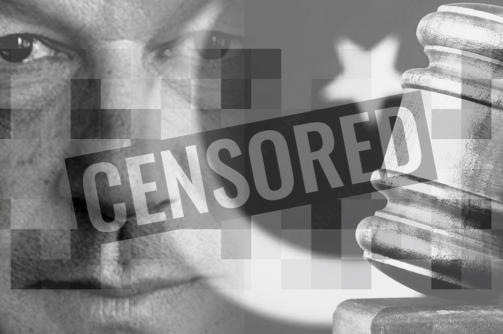- Web Desk
- Feb 24, 2026
Censorship’s paradox: stronger clampdown, stronger drive for truth
-

- Web Desk
- Jan 24, 2025

LAHORE: Pakistan’s media – traditional, mainstream and social – have been going through unprecedented heights of censorship. Yet, the drive to seek the truth has never been higher, resulting in a much higher access to information as well.
Also read: President, PM pledge AI advancement on International Day of Education
The state of freedom of expression in 2022–24 report by the Human Rights Commission of Pakistan (HRCP) shows that the degree of censorship has been the highest in Pakistan since the past few years – primarily with regards to Pakistan Tehreek-e-Insaf (PTI) and its former chairman Imran Khan. However, at the same time, those who can find the space to disseminate information – less viewed channels, and high viewed personalities – are bolder and louder than ever as well.
The almost-tangible shift in censorship began at the time of the vote of no confidence (VONC) in April 2022, after which the powers that be clamped down on the news reports, and barred them from even using the name or photos of Imran Khan.
The report mentions that while the clamp down came strong for some factions of the mainstream and digital media, those who were being sidelined under the PTI regime received a breath of fresh air – to the extent that some anchors were “taken from a third-tier channel and put on one of the top ten news channel’s screens”.
The report mentions the sombre assassination of Arshad Sharif and the ensuing self-censorship by journalists, but also calls out the excessive – and sometimes unwarranted – blame on the establishment. The PECA Act, for instance, was purely a political move by Pakistan Muslim League-Nawaz (PML-N) to counter the noise of PTI’s 2014 sit-in, the report mentions. However, it was touted as a clamp down by those who stifle dissenting voices.
Also read: Bias, bubbles, and black holes: Prejudice in political journalism
Chilling accounts of those who were “picked up” have also been featured in the report, with the additional information on how sometimes such tactics achieved the result opposite of what was expected. Certain YouTubers became social media sensations overnight just because the audiences perceived their previous work to hold “truth” that might have led to their disappearance.
At the same time, the pre-emptive censorship at times caused more information to be sought and revealed than it would have without censorship. The loss of trust in mainstream news channels – from both the political personalities and the general population – has been well-capitalised on by the digital media sphere.
As censorship increased for major TV news channels and popular Urdu newspapers, a larger space for journalistic expression opened up for social media journalists and those working for less widely read English and Urdu publications. The conversation became bolder among the masses, and the names which were not named before started to emerge in bits and pieces across multiple platforms, the report concludes.
Imran Khan has carved an economy for himself, the report analysed. Overseas Pakistanis are majorly pro-PTI and the social media earnings from UK and US viewers far exceed than those from Pakistani audiences. This simple flow of money meant that those operating in the digital sphere found a natural inclination to talk about Imran Khan and PTI, irrespective of their opinions on the policies of the person or the party.
Rise of terms like “software update” and meme culture also rose in response to increasing censorship, offering yet another avenue for public voices. Social media continues to serve as a potent platform for resistance, the report said. With social media more accessible to the masses too, there is also a higher than ever demand for accountability and transparency.
Also read: PTI refuses to attend January 28 meeting with the government
A much needed reflection for the journalistic community and the state itself, the report highlights that there is an urgent need to protect the freedom of speech and to ensure that legitimate voices are given proper platforms, to ensure that democratic principles are upheld.




